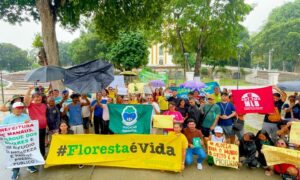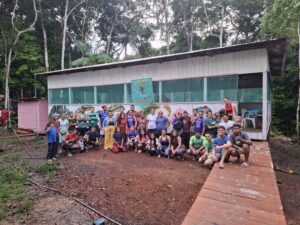Community leadership and representatives from the organizations that compose the Coletivo do Pirarucu (Arapaima Collective) met in Manaus to evaluate 2022 management, celebrate achievements, and plan the next steps.
Manaus | “It is an opportunity that few chains have to look at the bigger picture, understand themselves as a productive chain, creating ways and solutions to effectively attend several demands”, Diogo Giroto pointed out during the opening of the 7th meeting of the Coletivo do Pirarucu (Arapaima Collective). He is the coordinator of the Native Amazon Operation (OPAN) program. Between December 12-14, community leaderships, representatives of the organizations that compose the Collective and government agencies reunited in Manaus to evaluate the activities carried out in 2022, celebrate the achievements, and plan the new steps for 2023.
The event agenda included reports from each area on fishing throughout the year, results of the collective arrangement for the brand Gosto da Amazônia, updates on the pirarucu export project and on the traceability systems developed by the Association of Rural Producers of Carauari (Asproc) and the Brazilian Institute for the Environment and of Renewable Natural Resources (Ibama), in addition to talks about inspection and public policies. Forty-six people from 26 organizations participated in the discussions that happened during the three days of meetings.
The support to Coletivo do Pirarucu (Arapaima Collective) meetings is made possible through the project Cadeia de Valor Sustentáveis, an initiative supported by USAID/Brazil and implemented by the International Institute of Education of Brazil (IEB) with technical assistance from the United States Forest Service (USFS) and participation of Chico Mendes Institute for Biodiversity Conservation (ICMBio).
According to the 2022 fishing partial balance, which was based on data presented by the community associations that integrate the Collective, 23,000 managed arapaima were captured, adding up to 1.2 tons of fish. The managers work generated about R$ 6.3 million ($1.23 million), generating income to about 1,600 families. Besides the socioeconomic benefits, arapaima sustainable management plays an important role in the biodiversity conservation and territorial protection of at least 30 areas in Amazonas including Extractivist Reserves, Sustainable Development Reserves, Indigenous lands, and Fishing Agreement areas.
The importance of inspection to strengthen management
“Illegal fishing hinders the management in several aspects, from the environmental issues, including invasions and the clandestine fishing of arapaima and other species, to the market of managed fishing itself, impacting local initiatives to structure community enterprises. The operational cost of management is quite high, with at least 40% invested in territorial protection, so illegal fishing causes an absolutely unfair competition”, Felipe Rossoni explains. He is an indigenist at the Native Amazon Operation’s (OPAN).
During the Coletivo do Pirarucu (Arapaima Collective) previous meeting, held in July 2022 — one month after the murders of the indigenist Bruno Pereira and the journalist Dom Phillips in the Javari Vale —, ten community-based associations that integrate the Collective presented reports about threats and illegal activities happening in their areas. These reports were systematized and served as the basis for the production of a note sent to 11 federal and state agencies, in addition to candidates for the presidency and government of Amazonas, which included a series of denouncements, information and recommendations to the Brazilian State.
In order to broaden the discussion on the current situation and prospects for inspection in management areas, at this last meeting, the Collective promoted a meeting with the presence of representatives of the Brazilian Institute of the Environment and Renewable Natural Resources (Ibama) and the Brazilian Public Ministry (MPF).
“This year, 25 new Ibama employees joined the Amazonas team. For Nubio, who handles the management of the arapaima, there are four more people. So the perspective for 2023 is that we will be able to provide more agility in the demands related to management”, says James Bessa, environmental analyst at Ibama and coordinator of the Biodiversity Center (Nubio/AM).
Joel Bentes, representative of Ibama’s Environmental Inspection Center in Amazonas, drew attention to the importance of environmental education as a strategy for strengthening inspection. “Illegal fishing, deforestation, fires, mining, biopiracy and other environmental crimes must also be tackled through other strategies, such as environmental education. We cannot talk about inspection without talking about environmental education”, he pointed out.
“There would have to be thousands of public environmental agents to be able to defend the Amazon region, and there isn’t any. It is you who are doing this work, who are at the forefront and are a great example of organization and strength in the defense of the Amazon, the environment”, pointed out Fernando Merloto, public prosecutor in Amazonas.
Collective Dream
The last day of the meeting was dedicated to evaluating the work done by the Collective and discussing new action strategies for 2023. The participants were divided into four groups to work on preparing proposals for topics such as governance, public policies, commercialization and research. The result of the work was presented and validated in plenary.
Nurturing the collective dreams and celebrating the results achieved by the group is also very important to keep inspiring the cause. Thus, during a special moment of the meeting, the participants were invited to share a dream for the future of the Collective.
“Everyone recognizes the positive results of the group precisely because the individual dreams came together and formed a bigger dream, which is this Collective dream. And this dream is what keeps us alive and strong in the purpose of strengthening our communities and conserving the forest for managing arapaima. Dreams are also built through planning, actions and celebration! May we dream together more and more, each one doing their part”, said Ana Claudia Torres, coordinator of the Fishing Management Program at the Instituto Mamirauá.






